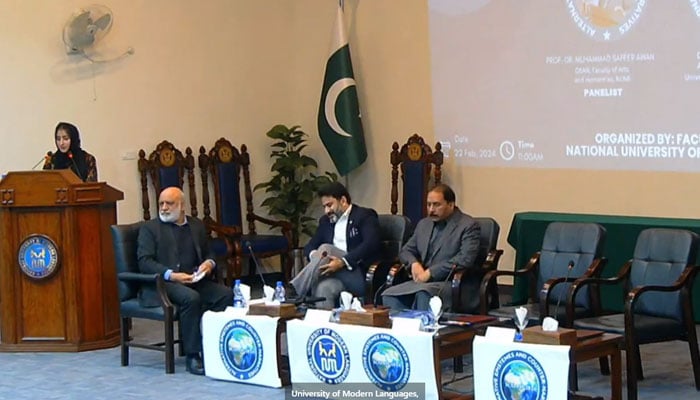Conference on arts and humanities held at NUML
Islamabad: Faculty of Arts and Humanities, National University of Modern Languages (NUML), Islamabad organized a Two-Day International Conference on “Alternative Epistemes and Counter- Narratives: Indigenizing Knowledge Production in Arts and Humanities”.
This two-day event brought together a diverse assembly of academic luminaries generating an awareness of the significance of indigenous knowledge production within the fields of Arts and Humanities.
The academics emphasized the need to shift the focus away from the western-centric knowledge paradigms and to set an agenda for the development and implementation of localized theories and research methodologies.
NUML Rector Maj. Gen. (r) Shahid Mahmood Kayani presided the opening ceremony and appreciated the novel theme of the conference. He emphasized the need to broadcast indigenous cultures, globalize local myths and folk wisdom, and celebrate poets and writers in their native languages.
Mohammad Shahid Hameed renowned Pakistani short story writer was the chief guest of the ceremony. The chief guest appreciated the significant debate raised through this conference. He mentioned that in the face of unprecedented global challenges such as rapid technological change, climate crisis, immigrants’ problems, neoliberal capitalist wars, postmodern cultural collage all over the world, and the onslaught of machines and AI, it is very important for us to develop our own perspectives on all such issue and prepare ourselves for the new challenges. 12 academic sessions and a parallel discussion session were held during the conference. A number of total 54 speakers from across the globe presented their papers in these sessions.
The conference featured various foreign and national speakers, including Prof. Luiza Franco Moreira from Binghamton University, New York, Prof. Boaventura Sousa de Santos from University of Coimbra, Portugal, Dr. Ahmar Mahboob from University of Sydney, Dr. Sayan Bhattacharyya from Yale University, USA, and renowned academicians from Pakistan Dr. Shahzeb Khan, University of the Punjab, Dr. Aroosa Kanwal, Quiad-i-Azam University, Prof. Dr. Waseem Anwar, Kinnaird College for Women, Prof. Dr. Mazhar Hayat, GC University, Faisalabad, Dr. Muhammad Sheeraz Dasti, IIU/McGill University, Canada, Dr. Pir. Suhail Ahmed Sarhandi, Aror University, Sukkar and Jamshed Iqbal, writer and translator, Islamabad.
Their presentations addressed the issue, challenging the academic imitative scholarship and shedding light on the path of advancing in a new direction. Closing ceremony of the conference was presided by Madad Ali Sindhi, Federal Minister of Education and Professional Training. In his address the honourable Minister emphasized the importance of regional languages and cultural diversity of the country. He was of the view that we are lagging behind on international acceptance of our historic and enriched literary legacy and such conferences will pave a way for our writers to be acknowledged globally.
Brig Shahzad Munir, Director General NUML chaired the ceremony and praised the efforts of the faculty in organizing a conference of this huge scale. He also encouraged students for Book writing for the production of indigenous theories about our indigenous cultures and society.
Prof. Dr. Muhammad Safeer Awan, Dean Faculty of Arts and Humanities presented recommendations of the conference. He emphasized the role of Language Promotion Department (National Language Authority), PAL, and other such instituions for the promotion of literary translations to and from Urdu and other Pakistani languages. He also highlighted the need of translation Projects in the departments of translation studies and practices, enhancing multilingual proficiency of scholars and students. He recommended that HEC should recognize local research journals, especially in social sciences, humanities, languages, and arts that showcase and frame local issues.
-
 Jennifer Aniston Already Decided Her Wedding Dress?
Jennifer Aniston Already Decided Her Wedding Dress? -
 Prince Harry, Meghan’s Hollywood Party Drama Exposes Chaotic PR Strategy
Prince Harry, Meghan’s Hollywood Party Drama Exposes Chaotic PR Strategy -
 Jennifer Garner Reacts To Savannah Guthrie's Video As Search For Nancy Guthrie Continues
Jennifer Garner Reacts To Savannah Guthrie's Video As Search For Nancy Guthrie Continues -
 Bad Bunny Leaves Fans Worried With Major Move After Super Bowl Halftime Show
Bad Bunny Leaves Fans Worried With Major Move After Super Bowl Halftime Show -
 Captain Jason Talks Personal Hardships He Faced Ahead Of 'Below Deck' Season 4
Captain Jason Talks Personal Hardships He Faced Ahead Of 'Below Deck' Season 4 -
 Anti-monarchy Group Reacts To Prince William, Kate Middleton Statement On Epstein Scandal
Anti-monarchy Group Reacts To Prince William, Kate Middleton Statement On Epstein Scandal -
 Andrew 'must' Apologize Not Wider Royal Family For Jeffrey Epstein Links
Andrew 'must' Apologize Not Wider Royal Family For Jeffrey Epstein Links -
 Super Bowl 2026: Why Didn't Epstein Survivors Ad Air On TV?
Super Bowl 2026: Why Didn't Epstein Survivors Ad Air On TV? -
 'Harry Potter' TV Series Exec Teases 'biggest Event In Streaming': Deets
'Harry Potter' TV Series Exec Teases 'biggest Event In Streaming': Deets -
 Camila Mendes Finally Reveals Wedding Plans With Fiancé Rudy Mancuso
Camila Mendes Finally Reveals Wedding Plans With Fiancé Rudy Mancuso -
 Beatrice, Eugenie Blindsided By Extent Of Sarah Ferguson’s Epstein Links
Beatrice, Eugenie Blindsided By Extent Of Sarah Ferguson’s Epstein Links -
 Girl And Grandfather Attacked In Knife Assault Outside Los Angeles Home
Girl And Grandfather Attacked In Knife Assault Outside Los Angeles Home -
 Super Bowl Halftime Show 2026: What Did Trump Say About Bad Bunny?
Super Bowl Halftime Show 2026: What Did Trump Say About Bad Bunny? -
 Piers Morgan Defends Bad Bunny's Super Bowl Performance, Disagrees With Trump Remarks
Piers Morgan Defends Bad Bunny's Super Bowl Performance, Disagrees With Trump Remarks -
 Andrew Lands In New Trouble Days After Royal Lodge Eviction
Andrew Lands In New Trouble Days After Royal Lodge Eviction -
 Instagram, YouTube Addiction Case Trial Kicks Off In California
Instagram, YouTube Addiction Case Trial Kicks Off In California




